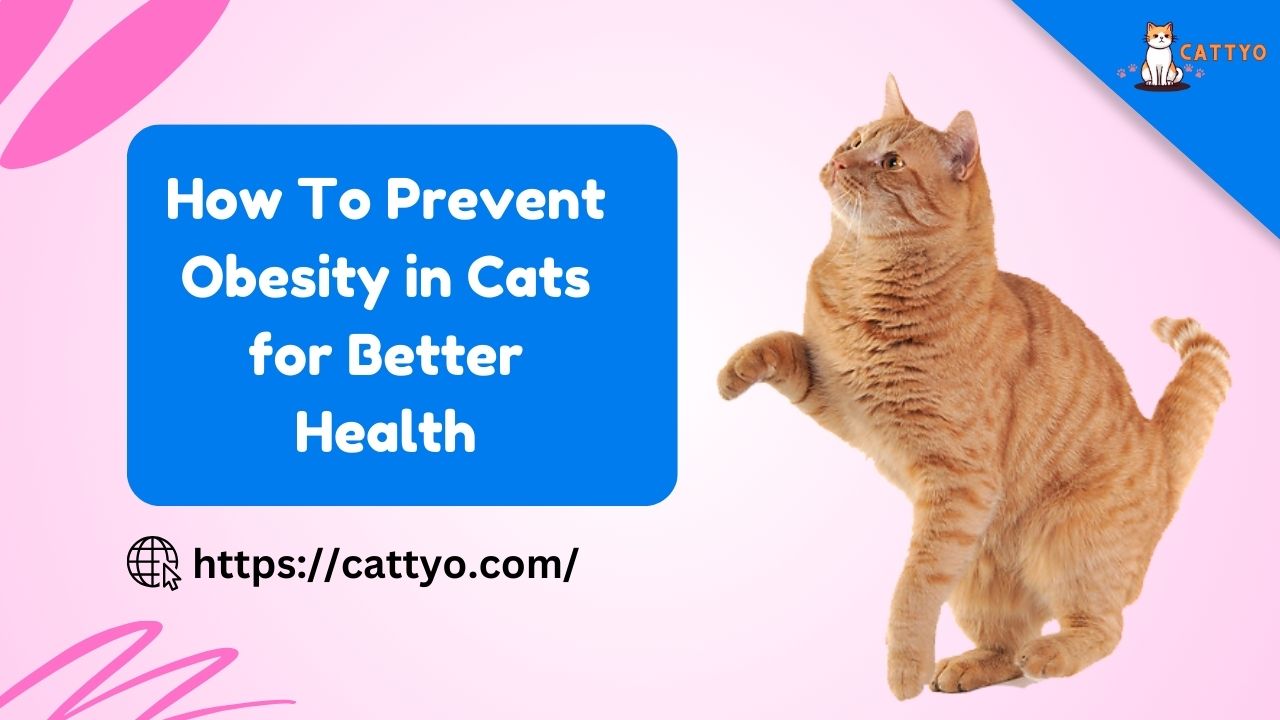To prevent obesity in cats, provide a balanced diet, control portion sizes, and limit treats. Encourage regular exercise through interactive play and stimulating environments. Monitor your cat’s weight and health with regular vet checkups to ensure they maintain a healthy body condition. Consistency in feeding routines also helps manage their weight.
We’ve all been there, right? You’re scrolling through your phone, laughing at those adorable “fat cat” memes, and suddenly it hits you: Is my cat getting a little too fluffy?
Well, you’ve noticed your feline friend packing on a few extra pounds or you’re just trying to be proactive about their health, the reality is that obesity in cats is a serious concern. In fact, it’s one of the most common health issues affecting our beloved pets.
But don’t panic just yet! There’s a lot you can do to keep your cat at a healthy weight without having to resort to extreme measures like feline boot camps. Let’s dive into some practical, real-world tips to help your kitty stay fit, happy, and (dare I say) Instagram-ready.
How To Prevent Obesity in Cats for Better Health
Preventing obesity in cats is crucial for their overall health. This can be achieved by providing a balanced diet, controlling food portions, encouraging regular exercise, and monitoring their weight. Consistent routines and regular vet checkups are also important to maintain a healthy weight and prevent obesity-related health issues.
- Feed a Balanced Diet: Choose age-appropriate, high-quality cat food and avoid overfeeding.
- Control Portions: Stick to recommended portion sizes and avoid free feeding.
- Encourage Regular Exercise: Use interactive toys, playtime, and climbing structures to keep your cat active.
- Limit Treats: Use treats sparingly to avoid extra calories.
- Monitor Weight: Regularly check your cat’s weight and body condition to detect any changes early.
- Establish a Feeding Routine: Feed your cat at consistent times to prevent overeating.
- Schedule Regular Vet Visits: Ensure your cat’s health is monitored and weight is maintained properly.
1. Portion Control: It’s Not Just for Humans
We’re all guilty of giving our cats that extra treat when they stare at us with those big, pleading eyes. But let’s face it, those extra snacks add up. Just like us, cats can easily become overweight when they’re constantly consuming more food than they need.
So, how much food should you really be giving them? Well, it depends on your cat’s age, activity level, and health, but generally speaking, sticking to the recommended serving size on your cat’s food package is a good place to start. Oh, and remember, those treats? They count too. It’s easy to forget that a few tempting treats throughout the day could be contributing to your cat’s expanding waistline.
Pro Tip: Measure their food. Don’t just eyeball it. It’s tempting to pour that big heap of kibble, but consistency and measurement will work wonders.
2. Quality Over Quantity: The Right Food Matters
We all love to spoil our pets with gourmet food, but sometimes, it’s not the best thing for them. You know that bag of cheap kibble that promises your cat a lifetime of joy (and extra pounds)? Well, it’s not doing them any favors. Some cat foods are loaded with fillers, carbs, and empty calories that don’t contribute to real nutrition.
Instead, aim for high-protein, low-carb options. Cats are obligate carnivores, so their bodies are designed to thrive on meat. Think fish, chicken, or turkey. And don’t forget to check the ingredients. If the first few are grains or by-products, you might want to look elsewhere.
Example: Consider switching to a higher-quality brand of wet food or a protein-packed dry food with minimal fillers. Your cat might be a little confused at first, but trust me, they’ll thank you later (okay, maybe not “thank you,” but you’ll see the difference in their energy and coat).
3. Get Them Moving: Playtime Isn’t Just for Kittens
Now, I know what you’re thinking: “My cat’s not a kitten anymore. They’re more of a nap enthusiast than an action hero.” But trust me, cats of all ages benefit from regular exercise. Think about it: a few minutes of playtime could mean the difference between a healthy cat and one who is steadily gaining weight.
Interactive toys like feather wands or laser pointers can keep them on their paws and mentally stimulated. You don’t need a full-on gym setup, but a few minutes of play each day can help your cat burn off those extra calories. It’s also a great way to bond!
4. Feeding Schedule: Consistency Is Key
Free feeding – the act of leaving food out all day – is a huge contributor to cat obesity. We might think it’s convenient for us, but for your cat, it can lead to mindless munching. Cats tend to eat when they’re bored, and left to their own devices, they’ll munch through the entire bowl. Plus, let’s be real, no one wants to clean up the mess when they’ve spilled kibble everywhere, right?
Establish a feeding schedule. It doesn’t have to be military strict, but aim to feed your cat at the same times each day. Your kitty will learn to expect meals at certain times, which can help with portion control.
5. Consider Their Health: Vet Visits Aren’t Just for Sick Cats
Okay, so your cat might be overweight, but are there any underlying health issues causing it? Cats who have hypothyroidism or other metabolic disorders can struggle to maintain a healthy weight. That’s why regular vet visits are a must. If you notice your cat gaining weight for no obvious reason, a quick check-up can help rule out medical conditions.
Sometimes, it’s not about food at all—it’s about your cat’s overall health. And if your vet recommends a special diet or weight-loss program, it’s worth listening. Obesity can lead to joint problems, diabetes, and even heart disease in cats, so don’t ignore it.
Quick Tips Table Of Prevent Obesity In Cats for Better Health
Preventing obesity in cats involves managing their diet, exercise, and weight effectively. Key strategies include feeding a balanced diet, controlling portions, providing regular physical activity, limiting treats, and ensuring routine vet checkups.
Maintaining a consistent feeding schedule and monitoring your cat’s body condition can help prevent obesity and improve their overall health.
| Tip | What It Means |
|---|---|
| Portion Control | Stick to the recommended food amount. Measure out their meals and don’t free-feed to avoid overeating. |
| Quality Over Quantity | Choose high-protein, low-carb food. Skip the fillers like corn and wheat and focus on meat-based diets. |
| Regular Playtime | Spend 10–15 minutes a day playing with your cat using interactive toys like feathers or laser pointers. They’ll love it, and you’ll help them stay fit. |
| Feeding Schedule | Feed your cat at the same times each day to establish a routine. Don’t leave food out all day for them to nibble on whenever they feel like it. |
| Regular Vet Visits | Ensure your cat’s health is checked regularly. Some health conditions can cause weight gain or make it harder for your cat to lose weight. |
FAQs About Prevent Obesity in Cats for Better Health
Q: My cat is already overweight. Can they still lose weight?
A: Absolutely! It might take some time and consistency, but with the right diet, exercise, and a solid plan, your cat can shed those extra pounds. Start by gradually adjusting their food intake and increasing their activity level. Always check with your vet before making any drastic changes.
Q: How can I tell if my cat is overweight?
A: If you can’t feel your cat’s ribs easily (with a gentle touch), they may be carrying a bit too much weight. A visible belly sag and difficulty grooming certain areas can also be signs. Your vet can give you a more accurate assessment.
Q: Are there any special foods for weight loss in cats?
A: Yes, some brands offer “weight management” foods that are lower in calories but still satisfy your cat’s hunger. These are designed to keep them full while helping them lose weight slowly. Your vet may also recommend prescription diets for more extreme cases.
Closing Thoughts
So, what’s the bottom line? Preventing obesity in cats doesn’t require drastic changes, but it does need a little effort and a lot of consistency. By paying attention to portion sizes, offering a balanced diet, keeping your cat active, and staying on top of their health, you can help them live a longer, happier life. After all, a healthy cat is a happy cat, and that’s what we all want, right?






